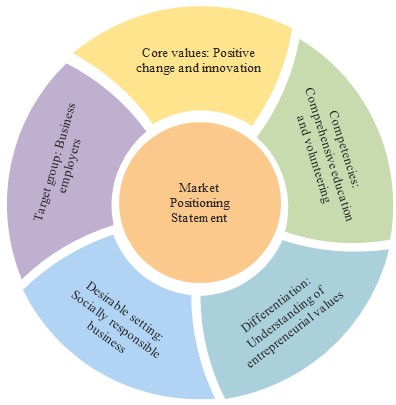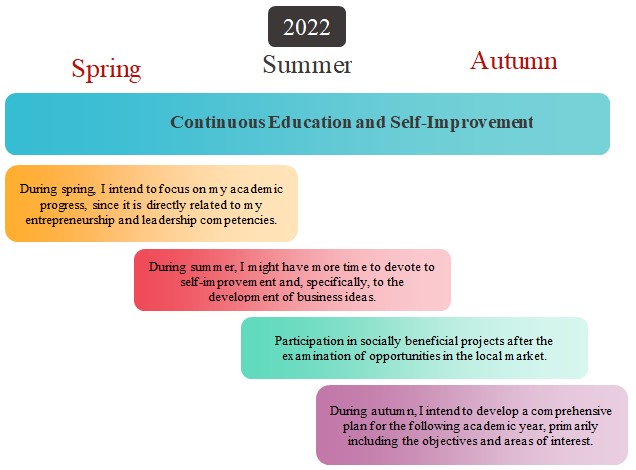Introduction
Entrepreneurship and innovation are essential parts of personal and career growth. In other words, it is more beneficial to understand entrepreneurship as a lifestyle, which can positively contribute to all areas of concern. The governing principles of the concept include the ability to turn problems into opportunities in order to make a positive change in society (John and Thomas, 2021). The idea aligns with sustainable development that assumes the improvement of environmental, social, and economic aspects to make life better for everyone (Singh and Reji, 2020). However, as I learned in the current course, “The idea is not enough. You have to implement it” is another essential concept of innovation. From these considerations, I believe that it is necessary to develop a specific plan that would assist me in achieving my objectives. Ultimately, the current paper thoroughly investigates the primary principles of entrepreneurship and proposes a personal business plan.
Vision and Opportunity
The first sub-chapter concerns my personal values and entrepreneurial qualities, which could help me identify future objectives. At present, my short-term goal is to continue my education and become more proficient in the current area of research. After learning more about entrepreneurship and the interconnectedness of societies, my purpose aligns more with making a positive change in the world. Naturally, my values and objectives have significantly changed over my life as I was learning more about the world and the people around me. However, at present, I consider the protection of the planet, both environmentally and socially, innovation, and optimism as my primary values.
Consequently, I believe that my primary market opportunity concerns socially beneficial projects. I could make particularly good use of my skills, values, and vision to help people in sustainable entrepreneurship. I am not entirely certain of a specific career at the time; however, I am confident in my abilities to make a positive change in society and contribute to the well-being of people around me. Therefore, my mission is to apply my knowledge of entrepreneurship to support the goals of sustainable development and create enduring value.
Marketing and Implementation
As mentioned briefly before, I consider socially beneficial projects as the primary direction of development. Therefore, it is essential to thoroughly understand the concepts of entrepreneurship, particularly the roadmap for achieving goals. Byers et al. (2005) state that entrepreneurs should incorporate vision, mission, and values in their work process to reach maximum productivity and positive impact on society. In this sense, I believe that my understanding of entrepreneurial values and desire to make a positive change differentiate me from other students. From the employer’s perspective, people who value societal contribution more than personal financial gain are valuable employees who can advance the organization. Similarly, this effect is dualistic in nature, implying that employees can shift the employer’s attitude toward positive changes in society by changing organizational culture (Richter, 2018). Ultimately, my market positioning statement is presented below in Figure 1 and primarily includes my values concerning positive societal contribution and willingness to change the organizational culture for the better.

Risks and Mitigation
Risks are inevitable consequences of entrepreneurship due to the nature of innovations. Marc and Joël-Thomas (2020) discuss that the relationship between risk and reward is one of the central concepts that determine the effectiveness of entrepreneurship. Many experts agree that entrepreneurs might have to risk their financial well-being in order to create a breakthrough product. As I learned in class, entrepreneurs initiate their ideas based on the service and market, as opposed to bureaucrats who emphasize resources and capital first. However, while chasing the breakthrough concept, it is possible to lose the sense of finances and human resources, making entrepreneurship a risky process (Marc and Joël-Thomas, 2020). Consequently, various external factors, such as economic crises, wars, and other undesirable events, might have a substantial negative impact on entrepreneurial objectives and business success. From these considerations, it is essential to understand the risk mitigation methods and minimize the dangers associated with entrepreneurship and innovation.
Concerning my personal business plan, I intend to develop risk mitigation strategies to increase my chances of success. First, I will determine the key milestones, including university graduation, continuous education, and work on socially beneficial projects. These are major steps in my foreseeable future, and each of them requires extensive work and dedication to achieve. I will determine the effectiveness of these milestones by a thorough reflection. My understanding of success is a happy life with a substantial contribution to the improvement of the world. Therefore, if the mentioned milestones will help me achieve my objectives, I would consider them to be effective. At present, I acknowledge the amount of effort that I need to put into the process to successfully accomplish these goals. However, in the past, my overconfidence led to significant problems and disappointment. Concerning failures, I have always had ambitious and unrealistic goals, such as changing society or immediately achieving worldwide popularity. It is beneficial to have long-term objectives, but, with time, I understood that overconfidence and escapism from reality are the major risks of entrepreneurship. Ultimately, I learned from my mistakes and acknowledged my weaknesses.
Entrepreneurial Ethics
Ethics is another significant concept in entrepreneurship, which implies that personal financial gain should never be a priority. Pierre (2017, p. 18) defines professional ethics as “the art or science of personal behavior morality, related to a professional activity.” Therefore, entrepreneurship should not be understood as a means to make money but rather as a lifestyle with a positive impact on society (Pierre, 2017). Defining good and evil evidently lies beyond the scope of entrepreneurship, but contemporary businesses are globally interconnected, and it is crucial to have certain regulations. For instance, entrepreneurial ethics incorporates various concepts, such as morals, integrity, ideology, responsibility, and mutual benefit (Pierre, 2017). Many of these ideas have been essential to the development of civilization and should continue to be a prioritized objective in the future. Thus, companies who reject these concepts in favor of financial gain should be held accountable for the violation of business ethics. Naturally, I admit that this perspective does not always work in the real world, but I believe that we, as aspiring entrepreneurs, should adhere to business ethics and strive for positive change.
If I were to choose three mentors for my entrepreneurship education, I would select Bill Gates, Ingvar Kamprad (founder of IKEA), and Hans Christian Andersen (a writer). While Bill Gates is the obvious choice for his extensive experience in entrepreneurship and contemporary business, I would like to elaborate on Kamprad and Andersen. Several years ago, I learned the story of Kamprad’s attitude toward employees and was inspired ever since. Despite the vast prominence of IKEA, he personally visited many of the shops, talked to staff about working conditions, and ensured the highest quality both of services and employee treatment. In my understanding, he was a great example of a successful entrepreneur and businessman who never lost his humanity. On the other hand, Andersen was born into poverty and experienced a harsh childhood. Nevertheless, he overcame the various challenges and became one of the most beloved writers of all time. Therefore, if I had the opportunity, I would like to talk to the mentioned three entrepreneurs.
Business plan in six words – ethical, socially responsible, and innovative development.
Further Development Strategies
Lastly, it is essential to discuss entrepreneurship and innovation in greater detail to propose further development strategies. As I learned in class, entrepreneurship is a method to create opportunities from problems, while innovation is the instrument of how to turn this opportunity into success. Thus, even though the two concepts are extensively interconnected, they are used for various objectives in business. Kennard (2021) states that a comprehensive understanding of both terms is essential to all managers, organizations, and governments. Consequently, there are different levels of entrepreneurship, depending on the scale and the purposes of the business. For instance, a start-up group focusing on bringing the existing technology to another region would be an example of small-scale entrepreneurship with an imitation approach (Zaleski, 2017). Ultimately, it is crucial to have a comprehensive understanding of entrepreneurship concepts to achieve success, and education plays a vital part in this process.
I believe that universities can teach the theoretical part of being a good leader and entrepreneur; however, practical skills and experience are essential. People primarily learn through experience and making mistakes is a natural method of acquiring new knowledge and competencies (Bano et al., 2018). Therefore, many prominent entrepreneurs and professionals might adopt the “novice mindset” while learning new skillsets, since it is frequently the fastest way to improve (Bano et al., 2018). Consequently, I believe that I am relatively innovative and entrepreneurial. I think so because I have the inner desire to make a positive change, and every time I hear the stories of successful entrepreneurs, I get motivated.
I would also say that I was entrepreneurial before the current course, and my position has not changed. However, I learned extensive academic material about the subject and became a more well-rounded entrepreneur. Concerning my leadership and entrepreneurship competencies, it is complicated to conduct a thorough self-assessment. I believe that asking for feedback and reflection on prior mistakes are the two best methods to understand your strengths and weaknesses. However, some prominent institutions, such as Harvard Business School, propose to use self-assessment questionnaires, including Emotional Competency and Personal Values tests (Gavin, 2019). Such metrics could potentially be used to evaluate the development of leadership competencies and emotional values over time. Documenting your personal growth is a beneficial strategy to maintain high levels of motivation, and taking similar tests might be effective for overall development.
Lastly, the Gantt Chart below in Figure 1 demonstrates some of the additional activities that I will be implementing in my personal business plan to become more entrepreneurial.

Reference List
Bano, M. et al. (2018). Learning from mistakes: An empirical study of elicitation interviews performed by novices. In: International Requirements Engineering Conference. Banff: Canada.
Byers, T., Dorf, R. and Nelson, A. (2005) Technology venture: From idea to enterprise (4th edition). McGraw Hill.
Gavin, M. (2019) Leadership self-assessment: How effective are you? Harvard Business School Online.
John, A. and Thomas, D. W. (2021) Entrepreneurship and the market process. Palgrave Macmillan.
Kennard, M. (2021) Innovation and entrepreneurship. Routledge.
Marc, D. and Joël-Thomas, R. (2020) Innovation and industrial policies. John Wiley & Sons.
Pierre, M. (2017) Ethics in social networking and business. 1, theory, practice and current recommendations. ISTE.
Richter, J. (2018) Employees to employers: Make a positive impact on society.
Singh, A. and Reji, E. M. (2020) Social entrepreneurship and sustainable development. Routledge India.
Zaleski, A. (2017) 7 businesses that cloned others and made millions. CNBC.